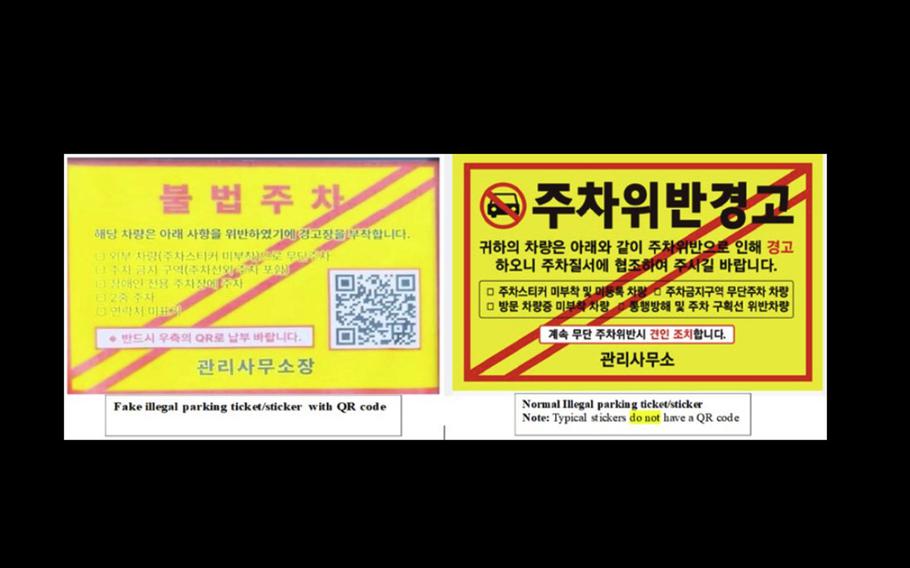
An example of a fake parking violation notice, left, and an authentic notice, right. (U.S. Army)
SUWON, South Korea — The U.S. Army is warning troops to beware of fake parking notices popping up in South Korea that direct drivers to malicious websites.
The bogus notices use QR codes to lure individuals to websites containing malicious software, Eighth Army said in a recent Facebook post.
The advisory was relayed by the Korea National Police Agency “in the spirit of cooperation,” Army spokesman Col. Juan Martinez said by phone Wednesday.
Apartment managers and businesses normally place these notices — either stickers or flyers — on a vehicle’s windshield to warn drivers they are illegally parked and may be towed. Legitimate notices do not contain QR codes and do not require drivers to pay a fine.
Tickets for driving infractions are issued by mail and arrive at registered home addresses, including individual mailboxes on U.S. military bases. Toll violation notices are typically sent via text message.
The sham notices bear design similarities to the authentic version, including the bright-yellow color and parallel red lines.
Examples posted by Eighth Army list several alleged violations, such as illegally parking in a neighborhood and failing to display proof of vehicle registration.
The fake notice includes a QR code and advises people to “be sure to use the [code].”
The Federal Trade Commission’s website advises people not to scan an unexpected QR code from an email or text message, particularly “if it urges you to act immediately.”
“If you think the message is legitimate, use a phone number or website you know is real to contact the company,” the commission’s website states.
QR codes are typically scanned using a smartphone camera and are widely used by South Korean companies for business transactions and by government agencies to direct users to an official website for information.
During the COVID-19 pandemic, travelers entering South Korea in 2022 were required to register their vaccination information with the Korea Disease Control and Prevention Agency. These travelers would be provided with a QR code, which was scanned upon arriving at the airport.
QR codes have reportedly been used for other illicit activities in South Korea. Business cards with a QR code and promoting “liquid weed” were discovered at Konkuk and Hongik universities in Seoul in October, according to a Yonhap News report at the time.
Flyers containing QR codes that redirected users to malicious websites were also discovered on electric scooter rentals in South Korea, according to a Maeil Business report in February.